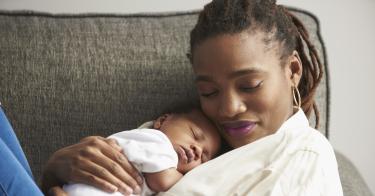The idea of a universal basic income—a taxpayer-funded minimum monthly payment meant to reduce poverty and improve opportunity—is alluring.
That’s especially true for low-income mothers of newborns. Unconditional cash payments could help parents meet their babies’ needs during their crucial development years, and could spare them some of the hassle of navigating a bureaucratic maze of dozens of different means-tested welfare programs.
Yet a randomized trial that did just that came up empty-handed.
A study by 15 scientific scholars found that the “Baby’s First Years” universal basic income trial had zero impact on child outcomes.
The “Baby’s First Years” randomized controlled trial consisted of 1,000 racially and ethnically diverse mothers who were recruited from 12 postpartum hospital wards during 2018-2019.
Those hospitals included four cities: New Orleans, New York, Omaha, and Minneapolis/St. Paul.
>>> Understanding Marriage Penalties in Welfare and Their Impact on Society
All the mothers had incomes below the federal poverty level: about $21,000 for a family of three in 2019 (most participants also had 1 or 2 older children). Participants assigned to the trial group received $333 per month ($4,000/year) and those assigned to the control group received $20 per month ($240/year) for the first four years of their children’s lives. The money was delivered electronically via a MasterCard debit card co-branded with “4MyBaby.”
The study examined four primary outcomes among the children: “language, executive function, social-emotional development, and resting high-frequency brain activity,” and three secondary outcomes: “visual processing/spatial perception, pre-literacy skills, and diagnosis of developmental conditions.”
Since income tends to have a positive effect on child outcomes, the researchers expected to find a significant difference in children receiving the larger UBI benefits. Instead, they found zero evidence of differences across all seven measured outcomes.
“Our strong test of the impacts of four years of unconditional cash transfers on the development of young children living in low-income families finds consistent null results, which may indicate that cash income alone does not have a causal effect on young children’s development in the contemporary policy context,” they concluded.
This finding reinforces the fact that, far from being a promising welfare catch-all, universal basic income is, at best, costly and ineffective. At worst, it harms those it aims to help.
Take a recent UBI experiment in Texas and Illinois, which found that it caused people to work less and earn less; incentivized more leisure at the expense of productive activities; and increased periods of non-employment.
>>> Medicaid Deserves To Be “Cherished and Loved”—and Reformed
Moreover, UBI failed to improve the quality of employment, failed to improve long-term food security, did not increase access to or utilization of health care, did not lead to lasting physical or mental health improvements, and did not improve personal finances.
While the Baby’s First Years program focused on child outcomes as opposed to those of the parents, if parents’ responses mimicked those of the Texas and Illinois trial, then their shift away from productive activities could explain the lack of positive child outcomes.
Moreover, while the study found no difference in outcomes for children at age 4, past studies suggest that universal basic income could actually hurt children’s long-term outcomes by increasing dependence on government.
Policymakers should seek to help low-income children and families by giving them a hand up instead of a handout. That includes streamlining existing welfare and workforce services, as Utah has done through itHED: s One Door policy, as well as removing barriers to things like affordable childcare, apprenticeships, and flexible work options.
This piece originally appeared in The Washington Times



